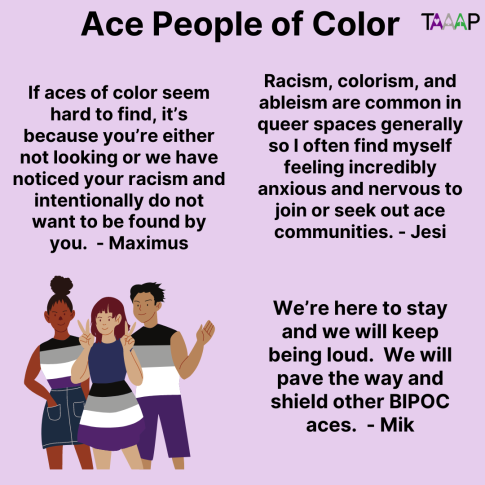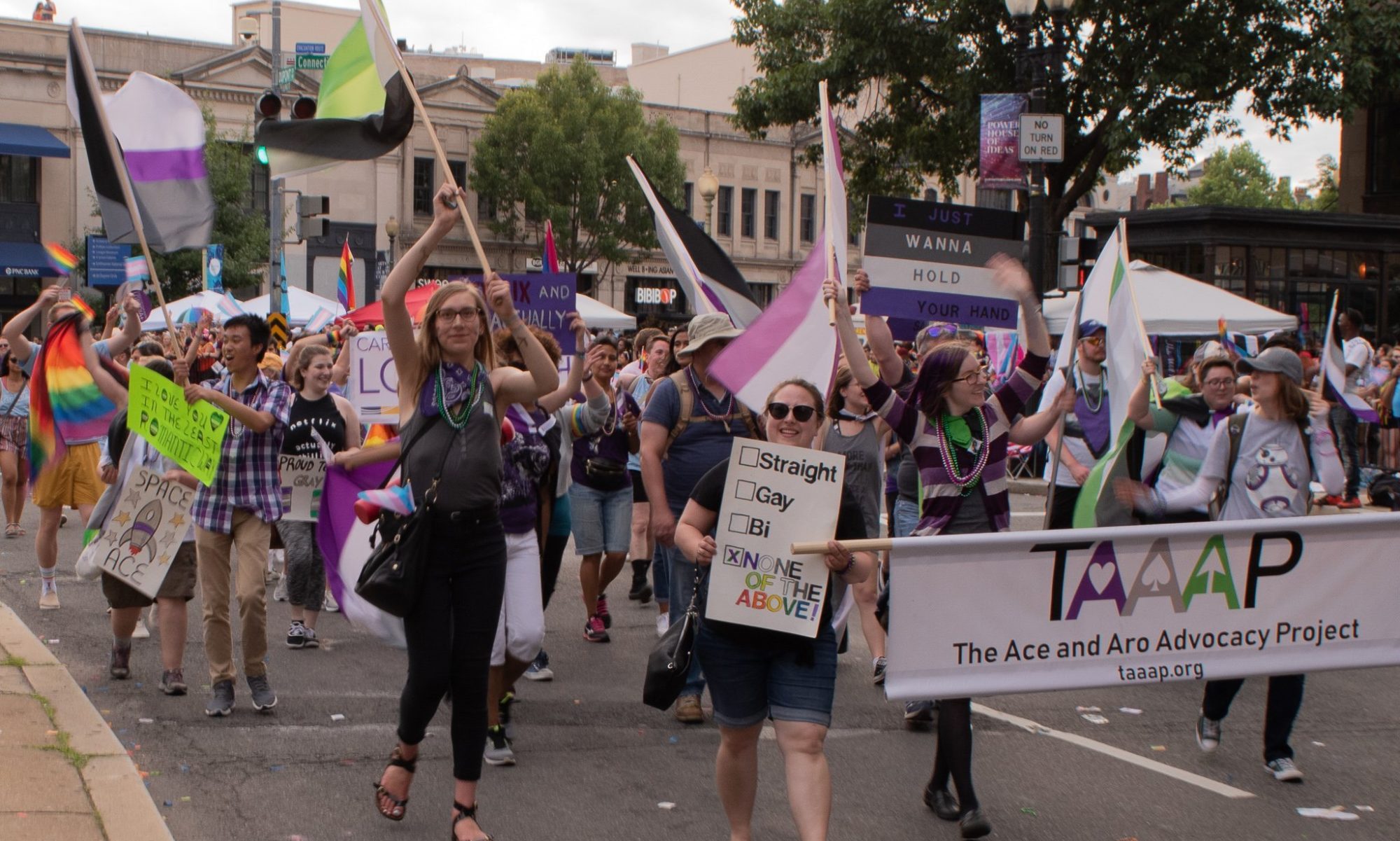
![Text: "Ace People of Color
Share my and fellow BIPOC Ace folk activist content, tip us for our labor, listen to us. - Marshall
[Non-Black asexuals'] asexuality does not absolve them of their complicity in the fetishization and dehumanization of Black people. - Sherronda J Brown
We have different experiences and struggles depending on our race and culture and that our stories need to be heard. We need to be represented not just as aces, but as BIPOC aces. - Ally Ravago"
Picture: A hand waving an ace flag](https://pbs.twimg.com/media/FCeFgM4XEAUsTiM?format=png&name=small)
The theme of Ace Week 2021 is “Beyond Awareness” so we wanted to focus on the struggles and issues of specific parts of the ace community – people who are often overlooked by mainstream allosexual people talking about asexuality and even hidden within ace communities.
Asexual people of color are too often left out of conversations and representation of our community, so we wanted to highlight some of their voices. Thank you to all who volunteered their time and shared their experiences.
Introductions
My name is Ally Ravago and I am a sex-repulsed aromantic asexual. I am a Filipino, born and raised in the Philippines and still living here.
My name is Eljay (she/her). I’m Filipino, and I was born and raised here in the Philippines. I’m grayromantic and asexual.
Jesi, Acespec, Black.
My name is Marshall and I’m Black and asexual.
My name is Maximus, I’m Gray asexual and Black/African American, Bi-racial.
My name is Mikhayl, but I go by Mik or Miktastic. I am Asexual and Panromantic (possibly grey aro). I’m Black.
Sherronda J. Brown; Asexual and Black.
How does your race intersect with your orientation?
AR: Some Filipino values clash with my orientation, such as being family oriented. The definition of family here is still very much the traditional one and I’m being pushed to start my own when that’s not what I want.
Eljay: There were so many times I thought “Maybe I’m not really asexual? I was probably just raised in a conservative Filipino family.” But when I found more Filipino aces, I saw my experiences mirrored in theirs, so I realized I probably couldn’t relate to other aces because of some cultural differences.
Marshall: For me, being Black Asexual is its own unique identity that people need to be more aware of! And it’s a diverse experience within itself and it continues to evolve as time goes by..
Maximus: Both are them are major parts of my life, and the marginalization of one amplifies the marginalization of the other, especially since racist stereotypes treat these identities as contradictory.
Mik: People assume that because I’m black I inherently have a high sex drive and high amount of sexual attraction. So people are often taken aback when I say I’m ace.
SJB: Anti-Blackness, both within and outside of asexual communities, can create barriers to Black asexuals coming to understand ourselves as asexual. The world seems unable to imagine Blackness as anything other than a monolithic body, greedy and given to sexual excess.
How is your experience in ace communities impacted by your race, or your experience with other people of the same race impacted by your orientation?
AR: I feel like I’m still not yet well-represented as a Filipino asexual in the wider ace communities as it feels dominantly white. I sometimes feel out of place with Filipino allosexuals because they can’t relate to my asexual experience.
Jesi: Racism, colorism, and ableism are common in queer spaces generally so I often find myself feeling incredibly anxious and nervous to join or seek out ace communities. Given past experiences in, honestly, the majority of spaces I navigate on a regular basis, I tend to approach joining or engaging with new groups or communities with caution. This is most often true with physical, non-digital spaces. I’ve had some luck with digital spaces, though. I can curate those experiences more effectively.
Marshall: I do think race has an impact on my experiences within Ace spaces, some positive and some negative. You have racism to deal with wherever you go and some people have to do better in learning how to interact with people different from them. That is why I am big on talking about the Black Asexual experience, because even in 2021 going on 2022, you still have people thinking that Asexuality is a “White thing” when it’s not – you can be of any race, nationality, ethnicity, religion, etc. Meeting fellow Black Ace folk has really opened my eyes even more to the need of this conversation.
Maximus: My Ace identity in black spaces/my black identity in Ace spaces doesn’t always feel relevant, but inevitably someone will make it clear that they accept one and not the other and I’m reminded that I’m on thin ice with certain parts of the community.
Mik: My experiences have been impacted because being Ace is inherently seen as a white thing. Most ace rep in media tends to be of white individuals and I think the only person of Color I’ve seen has been Pavarti from Outer Worlds. Thanks to Twitter I see many Black Ace voices and it makes me happy, but they tend to receive the most flak.
SJB: Anti-Black hypersexual myths are so endemic to our social structures that even non-Black asexuals still cannot manage to sever this connection in their minds. Their asexuality does not absolve them of their complicity in the fetishization and dehumanization of Black people.
How could ace communities better support you?
AR: To better support me, I’d like ace communities to provide platforms to my fellow Filipino asexuals for representation and a space to speak out about our unique experiences and to acknowledge the interrelationship between sexuality and race.
Marshall: Share my and fellow BIPOC Ace folk activist content, tip us for our labor, listen to us. Donate to Asexual Outreach (They are doing awesome work providing resources)
Maximus: Ace communities could speak more about the over-sexualization and fetishization of certain groups, and how to cope with and fight against that.
Mik: I think the Ace community could better support me by including more BIPOC voices. As with many queer movements, the face and forefront tend to be white (often cis, but not always) men. There are plenty of Black and Brown experiences that are overshadowed. And when our voices are heard, we’re normally scrutinized.
SJB: White asexuals who have platforms need to take the initiative to actively address anti-Blackness, they need to credit the Black aces they learn from, and they need to acknowledge the fact of that their whiteness helps to propel their careers.
What do you wish ace people knew about you or other BIPOC aces?
AR: We have different experiences and struggles depending on our race and culture and that our stories need to be heard. We need to be represented not just as aces, but as BIPOC aces.
Marshall: Hmmm, this is a good one – I want people to know that we BIPOC Ace folk have different experiences and that we deserve to have our voices heard without erasure and gaslighting.
Maximus: If aces of color seem hard to find, it’s because you’re either not looking or we have noticed your racism and intentionally do not want to be found by you.
Mik: We’re here to stay and we will keep being loud. We will pave the way and shield other BIPOC aces.
SJB: Even if/when we do receive opportunities, visibility, platforms, etc., Black asexuals still have to wade through racist antagonism, and there are rarely any white asexuals willing to defend us and/or talk about white supremacy.
What do you wish allosexual people knew about you or other BIPOC aces?
AR: BIPOC aces, such as myself, need to not only be acknowledged or recognized by our asexuality, but also by our racial and/or ethnic background.
Marshall: I want Allo people to know that we (BIPOC Ace folk) also exist and we’re valid.
Maximus: Allosexual people need to know and understand that we exist. Asexuality is often invalidated as a “trend” for young white women – this misrepresents the community and makes it hard for POC to both realize they’re ace and participate in the community.
Mik: This isn’t a phase. It isn’t just celibacy. It’s a way of life and we are here to stay. Representation matters and it would be nice to get more BIPOC and Ace in the media.
What do you wish people of your racial and/or ethnic background knew about asexuality?
AR: Asexuality is a valid orientation and that it simply means experiencing little to no sexual attraction. Asexuality is not about being broken or waiting for the “right one” to “fix” us.
Eljay: I just wish that more Filipinos had general knowledge on asexuality because it’s not well-known. Most people here haven’t even heard of the term outside its usage in a biology subject.
Marshall: That Asexuality ain’t a “White thing”. That someone like you can be the ethnic group and race AND be Asexual…It’s nothing to be ashamed of either.
Maximus: I wish, in general, that it was more acceptable for black women and femmes to be queer and to not pursue heterosexual relationships and child-rearing.
Mik: It’s not inherently white and it’s worth looking into. I’ve always tried to explore every avenue of myself, but I know there are individuals that can’t. Being Asexual is not being sentenced to loneliness and one can find love if they desire.
SJB: The fetishization of Blackness strips people of the ability to even fathom the possibility of Black asexuality, but societal myths of hypersexual Blackness need not define us. Honoring Black asexuality is necessary for sexual liberation for all Black people.
